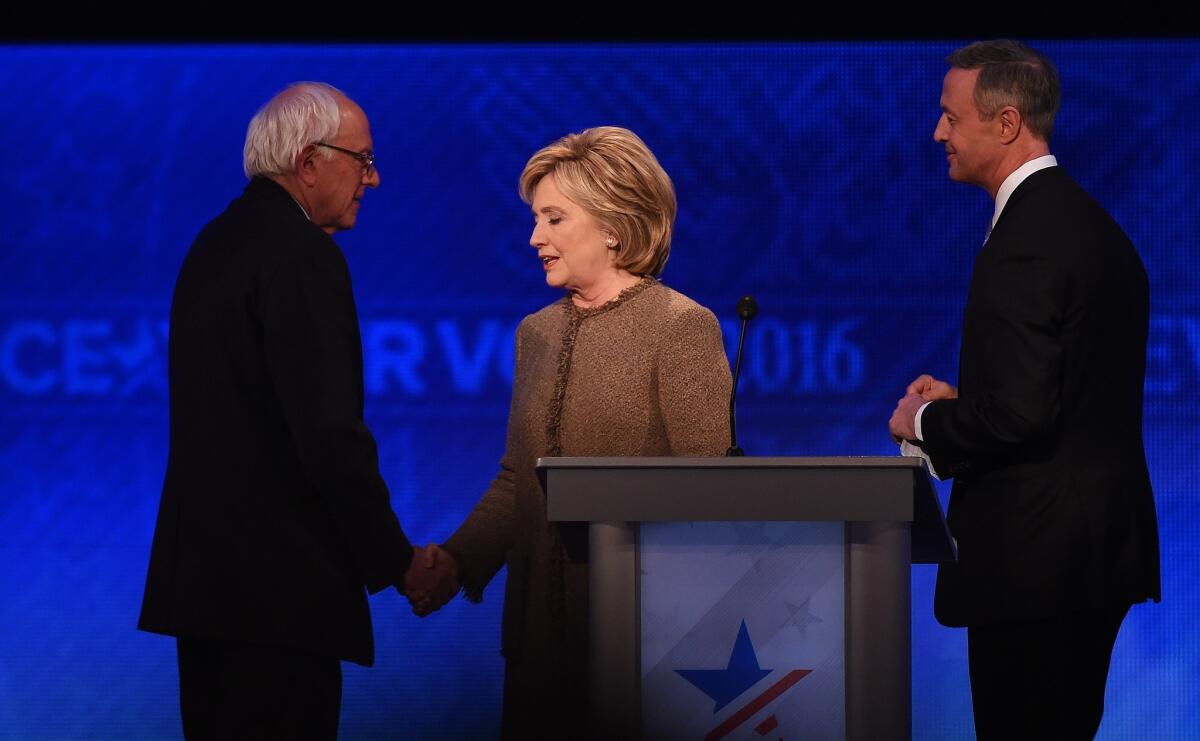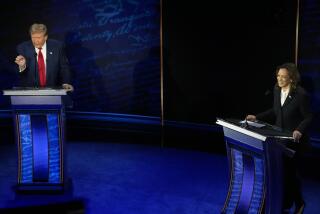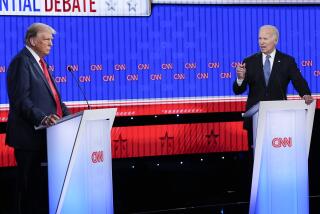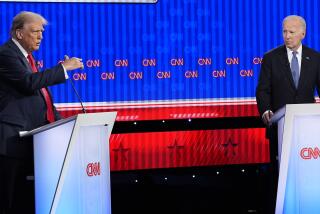A more prickly Democratic debate erupts in early-voting New Hampshire

Democratic presidential hopefuls Bernie Sanders, Hillary Clinton and Martin O’Malley, from left, greet one another after their New Hampshire debate.
- Share via
Reporting from MANCHESTER, N.H. — After two days of intense Democratic infighting, Bernie Sanders apologized for his staff’s snooping into Hillary Clinton’s campaign files at the opening of a cantankerous presidential debate Saturday that underscored sharp differences among the candidates on foreign policy, combating terrorism and raising taxes.
The testy exchanges during the debate in the first primary state of New Hampshire marked an antagonistic new chapter in what had been, to this point, a fairly agreeable contest. But from the beginning it was colored with tension from the controversy over the Sanders campaign’s unauthorized access to proprietary Clinton files on a joint voter database maintained by the Democratic National Committee.
The breach led the DNC to cut off Sanders’ access to the database Friday, prompting the independent senator from Vermont to take the issue to court. His access was restored just hours before the debate.
Asked during the debate whether he would apologize to Clinton, Sanders replied: “Yes, I apologize.”
Join the conversation on Facebook >>
Clinton, in response, said that her campaign was “distressed” by the entree into her files but that she appreciated his apology and wanted to “go forward” to discuss more substantive policy topics.
The conciliatory comments gave former Maryland Gov. Martin O’Malley his first opportunity of the night to blister both candidates as ignoring “pressing issues” facing the country. “Maybe that is normal politics in Washington, but that is not the politics of higher purpose that people expect from our party,” he said.
The aggressive tenor reflected a race that is careening swiftly toward the votes that will determine the next Democratic nominee. It was the last organized gathering of the three candidates this year; January will bring not only more debates but a ratcheted-up retail campaign presence in this and other early states.
O’Malley was aggressive throughout, castigating the other two candidates as representing “socialism” — Sanders — and “crony capitalism” — Clinton. He casting himself as the better and more youthful alternative. (He is 52, Clinton 68 and Sanders 74.)
“Can I offer a different generation’s perspective on this? I would suggest to you that we need to leave the Cold War behind us,” he said during one foreign policy exchange, which drew boos from the audience.
He also took after both competitors on the subject of guns. He criticized Sanders for his previous support of gun legislation backed by the National Rifle Assn., and attacked Clinton for, as he put it, changing her view on guns with each election year.
“What we need on this issue is not more polls. We need more principle,” he said, blaming access to assault weapons in the U.S. on “the flip-flopping, political approach of Washington that both of my two colleagues on this stage have represented there for the last 40 years.”
“Whoa, whoa,” Sanders pleaded. “Let’s calm down a little bit, Martin.”
Clinton implored O’Malley to “tell the truth.” “I applaud his record in Maryland. I just wish he wouldn’t misrepresent mine,” she added.
Clinton and Sanders occasionally worked together to try to bat down O’Malley’s criticisms, particularly after his remarks on guns. But the pair also disagreed fiercely on multiple matters, including Syria, healthcare and taxes.
Three times, Sanders raised Clinton’s vote for war in Iraq following the Sept. 11, 2001, attacks — the vote that helped vault Barack Obama over Clinton during her first run for the presidency in 2008.
“We disagreed on the war on Iraq. I voted against the war,” Sanders said. “I worry too much that Secretary Clinton is too much into regime change and a little bit too aggressive without knowing what the unintended consequences might be.”
Sanders argued that American attention should focus on combating the Islamic State terrorists operating in the Mideast and, as the Paris and San Bernardino terrorist shootings showed, extending their influence across the world. Clinton argued that that approach needed to be accompanied by an international effort to push aside Syrian President Bashar Assad.
“With all due respect, Senator, you voted for regime change with respect to Libya,” she said. “If we had not joined our European partners and our Arab partners to assist the people in Libya, you would be looking at Syria” in Libya too, she added, referring to the deaths of more than 200,000 people and the refugee crisis enveloping much of Europe.
Clinton later downplayed the continued unrest in Libya, saying, “I’m not giving up on Libya.”
Although nationally televised, the debate’s most important audience may well have been in the state where it occurred, New Hampshire, which looms as a must-win for Sanders, since he is from next-door Vermont.
He has a narrow lead in New Hampshire, which holds the first-in-the-nation primary on Feb. 9, but he has not been able to make a dent in Clinton’s commanding national lead. (O’Malley has been mired in the low single digits throughout, far behind the top two.)
Sanders and Clinton also clashed on the taxes that she said would be required to fund the social programs that he seeks to create, including universal healthcare and free college for all. Clinton, who has pledged she would not raise taxes on families earning less than $250,000, said Sanders’ promises were unrealistic.
“You are going to have to get more taxes out of the middle class” to fund the Sanders agenda, she said. “I don’t think we should be imposing new big programs that are going to be raising middle-class families’ taxes.”
Sanders disagreed.
“Secretary Clinton is wrong,” he said, and added that her objections were akin to those who opposed revered Democratic programs like Social Security and Medicare. And he noted that many of Clinton’s allies in Congress were pushing a landmark paid family leave plan, which would cost middle-class families $1.61 per week — a measure not supported by Clinton, who is promoting a plan that would be funded by other means.
“Secretary Clinton, a buck sixty-one is a pretty good investment,” Sanders said.
Despite the engaged performances by the trailing candidates, there was little to suggest the exchanges would reshape the race.
A sweeping victory by Sanders was negated when he had to open the debate with an apology for his campaign’s actions in accessing Clinton’s campaign files. While the dispute may have been a bit too “insider” for many voters, it undercut somewhat Sanders’ positioning as the principled alternative to the front-runner. Clinton’s campaign, which called the action a “theft,” worked to make that point over the last two days.
But Clinton and Sanders tried to put that in the rearview mirror, repeatedly noting that the Democrats on stage agreed more than they disagreed, and represented a better choice than any of the Republicans competing in a frenzied campaign for their party’s nomination.
Halper and Memoli reported from Manchester and Decker from Los Angeles.
Follow us on Twitter for more politics: @cathleendecker, @evanhalper, @mikememoli
ALSO
Sanders gets his database access restored after supporters protest
Pentagon chief calls friendly fire strike ‘a mistake,’ sends condolences to Iraq
Terrorism and tough talk take center stage at Republican presidential debate
More to Read
Get the L.A. Times Politics newsletter
Deeply reported insights into legislation, politics and policy from Sacramento, Washington and beyond. In your inbox twice per week.
You may occasionally receive promotional content from the Los Angeles Times.













